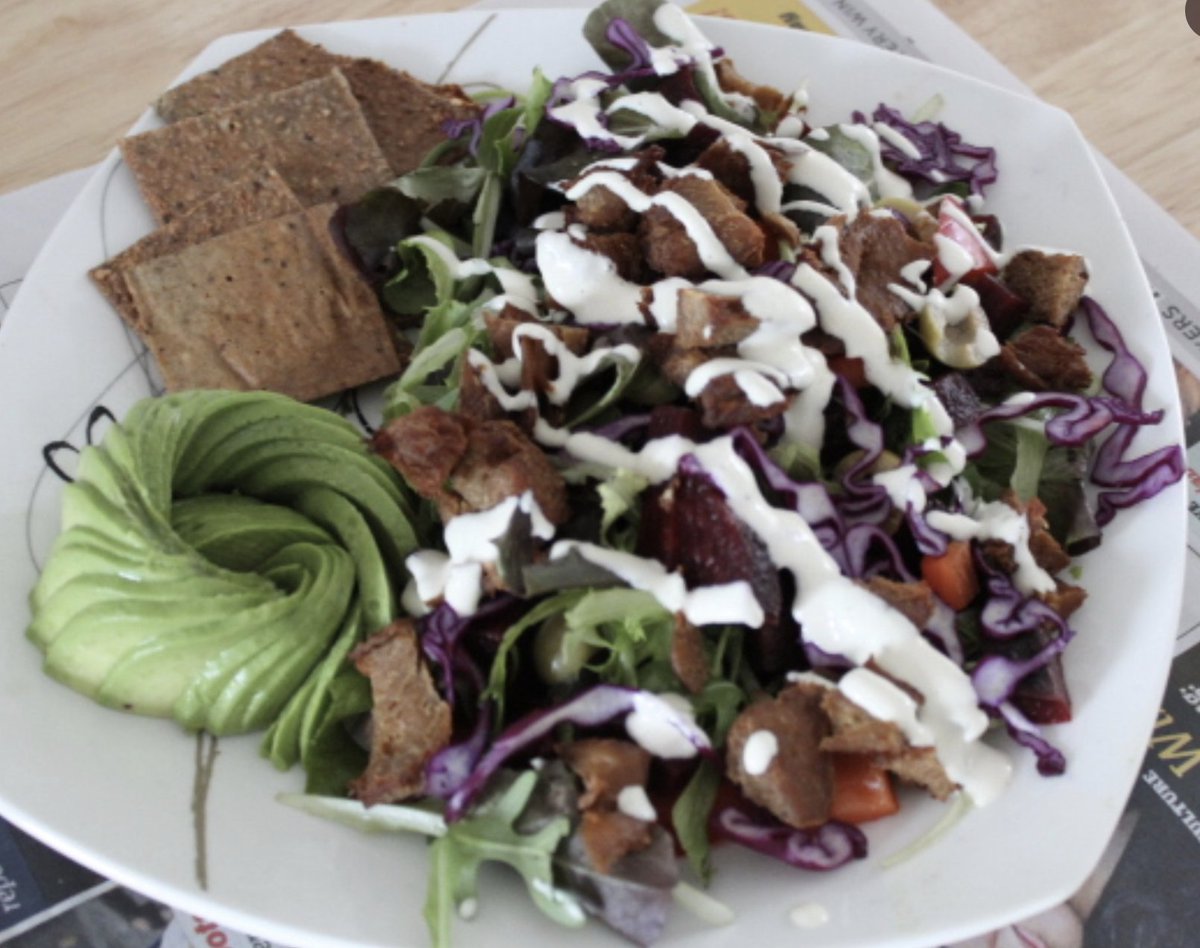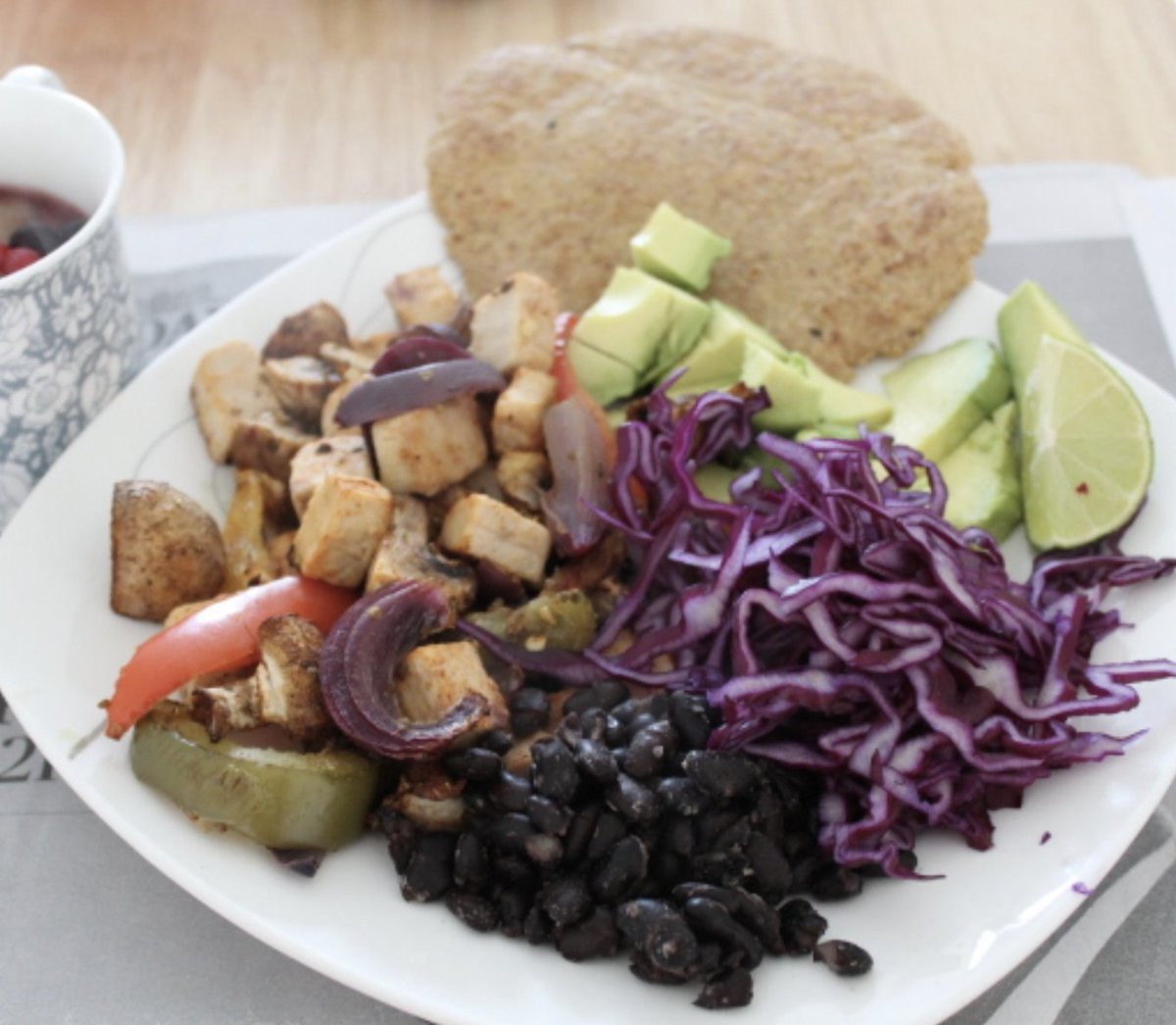(1/n) Some ideas on the planning of a healthy low-carb plant-based diet.
A THREAD 👇⬇️
#Vegan #plantbased #lowcarb #ecoatkins
A THREAD 👇⬇️
#Vegan #plantbased #lowcarb #ecoatkins
(2/n) ⚠️TWITTER IS NOT A SOURCE OF MEDICAL ADVICE⚠️
• If you have a serious medical condition &/or take medication, it is necessary to consult your doctor before making changes to your diet.
• Ketogenic diets have been associated with serious side-effects.
• If you have a serious medical condition &/or take medication, it is necessary to consult your doctor before making changes to your diet.
• Ketogenic diets have been associated with serious side-effects.
(3/n) During the first 7 days on a low-carb diet I suffered: head/muscle aches, hunger, fatigue.
AFAIK alleged ‘cures’ for so-called 'keto flu' haven’t been empirically tested.
I did keep hydrated (but this is *generally speaking* a good idea anyway).
AFAIK alleged ‘cures’ for so-called 'keto flu' haven’t been empirically tested.
I did keep hydrated (but this is *generally speaking* a good idea anyway).
(4/n) Arguably, a diet 'qualifies' as low-carb, when net carbs† are kept <130g per day.
I keep net carbs just below 50g.
However, this thread will be relevant to those merely looking to lower their (net) carb intake to any degree.
† Net carbs = total carbs - fibre.
I keep net carbs just below 50g.
However, this thread will be relevant to those merely looking to lower their (net) carb intake to any degree.
† Net carbs = total carbs - fibre.
(5/n) Low(er) carb diets are superior for diabetes management, as they ↓ glucose variability: those on low-carb diets tend to require less medication.
However, the safety of animal-based low-carb diets is questionable – especially in terms of cardiovascular health.
However, the safety of animal-based low-carb diets is questionable – especially in terms of cardiovascular health.
(6/n) A well-planned plant-based low-carb diet would very much appear to be a safer option.
Plant-based proteins and fats are reliably associated with better health outcomes.
Plant-based proteins and fats are reliably associated with better health outcomes.
(7/n) To improve the healthfulness of any low-carb diet one ought to include lots of *unrefined/unprocessed plants*.
While I do include some processed foods, whole plant foods always dominate my meals.
While I do include some processed foods, whole plant foods always dominate my meals.
(8/n) All plants contain carbs, fat and protein.
The fibre in plants is a kind of carbohydrate which one subtracts from total carbs to arrive at “net carbs”.
Obviously, plants low in net carbs are the most low-carb friendly.
The fibre in plants is a kind of carbohydrate which one subtracts from total carbs to arrive at “net carbs”.
Obviously, plants low in net carbs are the most low-carb friendly.
(9/n) Plant foods to avoid/restrict when on a low-carb diet:
• Sugars/syrups
• Grains (including pseudo cereals) and grain-products
• Non-soy legumes
• Starchy vegetables
• Many fruits
• Dried fruit
• Sugars/syrups
• Grains (including pseudo cereals) and grain-products
• Non-soy legumes
• Starchy vegetables
• Many fruits
• Dried fruit
(10/n) There are 4 main categories of low-carb plant foods:
① Low-carb plant-based sources of protein
② Non-starchy vegetables.
③ Low-carb fruits
④ Nuts, seeds, avocados, oils.
① Low-carb plant-based sources of protein
② Non-starchy vegetables.
③ Low-carb fruits
④ Nuts, seeds, avocados, oils.
(11/n) Depending on how strict you want to be, you may find it helpful to know the amount of net carbs in individual foods.
The amount of net carbs can vary considerably between foods belonging to the same group: I will give some examples below.
The amount of net carbs can vary considerably between foods belonging to the same group: I will give some examples below.
(12/n) Net carbs in a selection of low-carb plant-based sources of protein (per 250kcal):
Tofu: 2.3g
Soy milk: 3.4g
Vivo protein powder: 4.6g
Tempeh: 5.2
Quorn fillets: 5.7g
Seitan: 8.9g
Tofu: 2.3g
Soy milk: 3.4g
Vivo protein powder: 4.6g
Tempeh: 5.2
Quorn fillets: 5.7g
Seitan: 8.9g
(13/n) Net carbs in a selection of raw non-starchy vegetables (per cup):
Bok choy: 0.8g
Kale: 1.5g
Cauliflower: 3.2g
Radishes: 3.3g
Spring onion: 4.7g
Bell peppers: 5.9g
Onion: 15g
Bok choy: 0.8g
Kale: 1.5g
Cauliflower: 3.2g
Radishes: 3.3g
Spring onion: 4.7g
Bell peppers: 5.9g
Onion: 15g
(14/n) Net carbs in a selection of ‘low-carb' fruits (per cup):
Raspberries: 6.7g
Strawberries: 8.6g
Grapefruit: 10g
Currants (red or white: 10.6g
Blackberries: 12.4g
Apple: 14.3g
Honeydew melon: 15.8g
Sour cherries: 16.4g
Blueberries: 16.9g
Sweet cherries: 21.4g
Raspberries: 6.7g
Strawberries: 8.6g
Grapefruit: 10g
Currants (red or white: 10.6g
Blackberries: 12.4g
Apple: 14.3g
Honeydew melon: 15.8g
Sour cherries: 16.4g
Blueberries: 16.9g
Sweet cherries: 21.4g
(15/n) Net carbs in a selection of plant-based sources of fat (per 250 kcal):
Extra-virgin olive/rapeseed oil: 0g.
Pecans: 1.5g
Macadamia: 1.8g
Avocado: 2.8g
Almonds: 3.9g
Pistachio: 7.4g
Cashews: 12.2g
Extra-virgin olive/rapeseed oil: 0g.
Pecans: 1.5g
Macadamia: 1.8g
Avocado: 2.8g
Almonds: 3.9g
Pistachio: 7.4g
Cashews: 12.2g
(16/n) I find it helpful to use a nutrition tracking app (such as cronometer.com) to plan my meals.
I decide what kind of meal I want to eat and if necessary, I’ll substitute some foods for comparable lower carb options (e.g., swapping macadamia for cashews).
I decide what kind of meal I want to eat and if necessary, I’ll substitute some foods for comparable lower carb options (e.g., swapping macadamia for cashews).
(17/n) Equally, I strive to include higher carb whole plant foods such as non-soy legumes (in smaller amounts).
These are foods linked with good health outcomes and thus are worth including when possible.
These are foods linked with good health outcomes and thus are worth including when possible.
(18/n) I regularly eat a lot of tofu because:
• It’s low in carbs and calories.
• High in protein.
• I can easily make it myself in large batches.
• It’s low in carbs and calories.
• High in protein.
• I can easily make it myself in large batches.
(19/n) I regularly eat kale because:
• It’s a good source of: calcium, beta-carotene, omega 3 and vitamin K.
• It’s a good source of: calcium, beta-carotene, omega 3 and vitamin K.
(20/n) I regularly eat nutritional yeast because:
• It enhances the flavour of savoury dishes.
• It’s a good source of B1, B2, B3, B6, folate and zinc.
• It enhances the flavour of savoury dishes.
• It’s a good source of B1, B2, B3, B6, folate and zinc.
(21/n) I regularly eat mushrooms because:
• They're a good source of B vitamins (especially B5).
• They’re tasty additions to all savoury dishes IMO.
• They're a good source of B vitamins (especially B5).
• They’re tasty additions to all savoury dishes IMO.
(22/n) I almost never use oils, but when I do I choose extra-virgin oils that are low in saturated fat.
Oils are carb-free and thus can be helpful to ensure that one consumes enough energy on a low-carb plan.
Oils are carb-free and thus can be helpful to ensure that one consumes enough energy on a low-carb plan.
(34/n) Meal examples: Peppercorn sauce with a source of plant protein and vegetables.
https://twitter.com/ScepticalDoctor/status/1417029691266027521
• • •
Missing some Tweet in this thread? You can try to
force a refresh







































